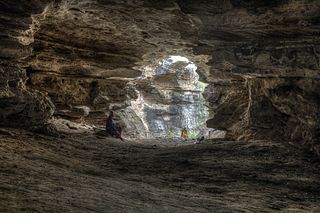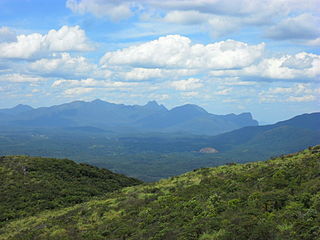
Canindé de São Francisco is a municipality located in the Brazilian state of Sergipe. Its population was 30,402 (2020) and its area is 902.2 km2 (348.3 sq mi).

The Catimbau National Park is a national park in the state of Pernambuco, Brazil. It protects a semi-arid area of caatinga with sandstone caverns and caves in which prehistoric art has been found.

Córrego do Veado Biological Reserve is a biological reserve in the municipality of Pinheiros, Espírito Santo, Brazil.

Serra Negra Biological Reserve is a Biological reserve in the state of Pernambuco, Brazil.

Comboios Biological Reserve is a biological reserve in the state of Espírito Santo, Brazil.

Raso da Catarina Ecological Station is a strictly protected ecological station in the state of Bahia in Brazil. It lies in the Raso da Catarina ecoregion of the Caatinga biome.

Tupiniquins Ecological Station is a coastal marine ecological station on the coast of São Paulo State, Brazil.

The Cubatãozinho River is a river of Paraná state in southern Brazil.

The Furna Feia National Park is a national park in the state of Rio Grande do Norte, Brazil that contains a large cave system.

The Rio São Francisco Natural Monument is a natural monument in the states of Alagoas, Bahia and Sergipe, Brazil. It protects a section of dramatic canyons on the São Francisco River and the surrounding caatinga environment, while supporting tourism and ecotourism.

Boa Nova National Park is a national park in the state of Bahia, Brazil.

The Serra da Baitaca State Park is a state park in the state of Paraná, Brazil.

The Maravilha Environmental Protection Area is a municipal environmental protection area in the state of Rio de Janeiro, Brazil.

The Caatinga Ecological Corridor is an ecological corridor in the caatinga biome of northeast Brazil.

The Cocorobó Area of Relevant Ecological Interest is an area of relevant ecological interest in the state of Bahia, Brazil.

The Maurício Dantas Private Natural Heritage Ecological Reserve is a private natural heritage reserve in the state of Pernambuco, Brazil. It protects an area of dry caatinga vegetation.

The Serra Branca / Raso da Catarina Environmental Protection Area is an environmental protection area in the state of Bahia, Brazil. Its sandstone cliffs are home to the endangered Lear's macaw.

The Lagoa do Parado Municipal Nature Park is a municipal nature park in the state of Paraná, Brazil. It protects an area of marshland rich in biodiversity.

The Serra da Ibiapaba Environmental Protection Area is an environmental protection area in the states of Piauí and Ceará, Brazil. It contains fragments of cerrado, caatinga and Atlantic Forest, and is home to the endangered red-handed howler.

The Castanhão Ecological Station is an ecological station (ESEC) in the state of Ceará, Brazil. It protects an area of caatinga vegetation adapted to arid conditions to the south of the Castanhão Dam.
This page is based on this
Wikipedia article Text is available under the
CC BY-SA 4.0 license; additional terms may apply.
Images, videos and audio are available under their respective licenses.







